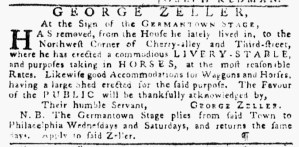What was advertised in a colonial American newspaper 250 years ago today?

“The Germantown Stage plies from said Town to Philadelphia Wednesdays and Saturdays.”
In the summer of 1773, George Zeller placed an advertisement in the Pennsylvania Gazette to announced that he moved to a new location “where he has erected a commodious LIVERY-STABLE, and purposes taking in HORSES, at the most reasonable rates.” In addition, he built a “large shed” for “Accommodations for Waggons and Horses.” He hoped that prospective customers would seek out those services at that new location. In addition, he promoted another service. The “Sign of the “GERMANTOWN STAGE” marked the stable. Twice a week, on Wednesdays and Saturdays, the stage transported passengers and freight from Germantown to Philadelphia, returning to Germantown on the same day. Colonizers interested in engaging those services needed to “Apply to said Zeller.”

The savvy Zeller supplemented his notice in the Pennsylvania Gazette with the same advertisement, though in German, in the Wöchentliche Pennsylvanische Staatsbote, the newspaper published by Henry Miller in Germantown. Given his affiliation with the Germantown Stage, “der Germantauner Reisewagen,” as well as his surname, Zeller may not have required Miller’s assistance in translating his notice. All the same, a nota bene in the masthead of the Wöchentliche Pennsylvanische Staatsbote stated that “All ADVERTISEMENTS to be inserted in this Paper, or printed single by HENRY MILLER, Publisher hereof, are by him translated gratis.”
By advertising in newspapers printed at both ends of the stage route, Zeller aimed to generate business for both the stagecoach and, especially, his stable. Passengers in Germantown would have made arrangements with an operator on that end, but travelers making the journey on their own needed a place to stable their horses once they arrived in Philadelphia. Zeller signaled to those travelers that he offered not only a “commodious” stable and low prices but also the convenience of conducting business with a provider who regularly engaged with customers who spoke German as their preferred language.
